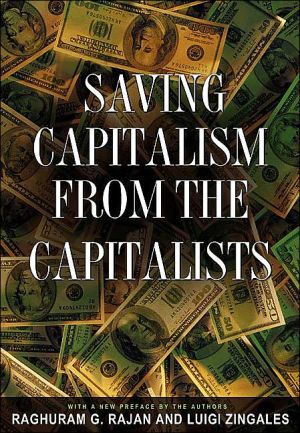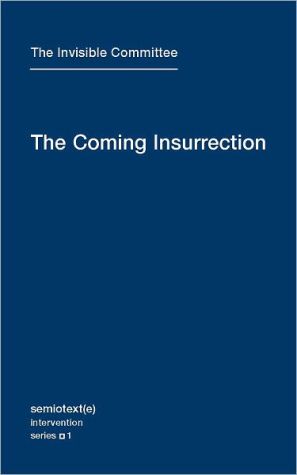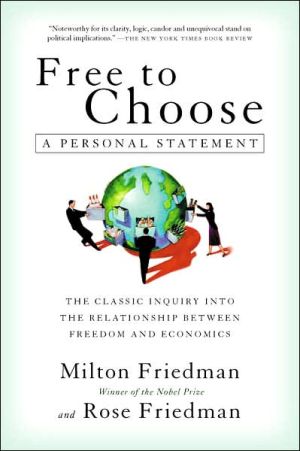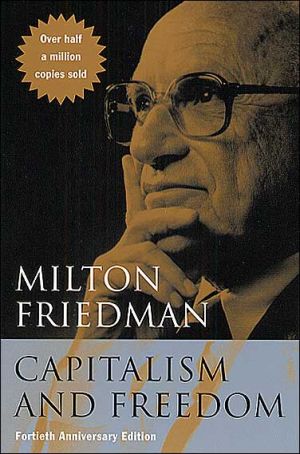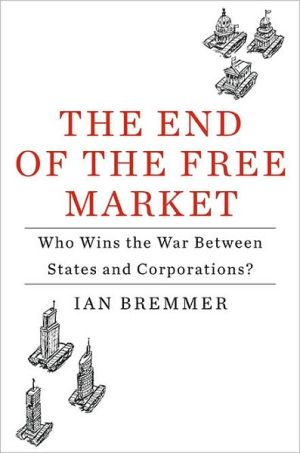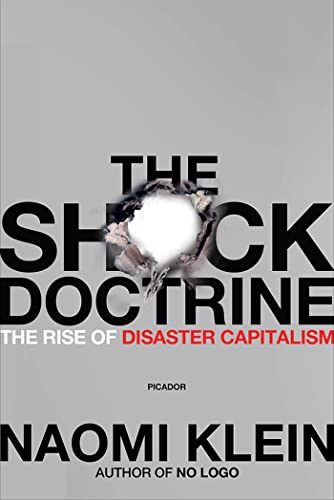Saving Capitalism from the Capitalists: Unleashing the Power of Financial Markets to Create Wealth and Spread Opportunity
Saving Capitalism from the Capitalists is a groundbreaking book that will radically change our understanding of the capitalist system, particularly the role of financial markets. They are the catalyst for inspiring human ingenuity and spreading prosperity. The perception of many, especially in the wake of never-ending corporate scandals, is that financial markets are parasitic institutions that feed off the blood, sweat, and tears of the rest of us. The reality is far different.\ This book...
Search in google:
Saving Capitalism from the Capitalists is a groundbreaking book that will radically change our understanding of the capitalist system, particularly the role of financial markets. They are the catalyst for inspiring human ingenuity and spreading prosperity. The perception of many, especially in the wake of never-ending corporate scandals, is that financial markets are parasitic institutions that feed off the blood, sweat, and tears of the rest of us. The reality is far different. This book breaks free of traditional ideological arguments of the Right and Left and points to a new way of understanding and spreading the extraordinary wealth-generating capabilities of capitalism. Publishers Weekly Rajan and Zingales take the Chicago school of economic theory in a new direction with an erudite, comprehensive defense of the free market system, steering a course between conservative isolationists and liberal antiglobalizationists. Only unfettered markets, rather than protectionism, they argue, can provide an environment supporting competition, innovation and economic growth. When businesses suffer losses or fail completely, it means competition is successfully weeding out the incapable-and the authors have nothing but harsh words for governmental attempts to prop up sagging industries through subsidies or tariffs on foreign competitors. They're honest in acknowledging that their "tough break" approach to failure offers little consolation to downsized laborers, but gamely suggest the economically "distressed" should recognize their options and look beyond obfuscating corporate rhetoric about "saving jobs." The book draws strong historical parallels between the half-century market clampdown following the Great Depression, when the public recoiled at the consequences of unmanaged economic risk, and the pessimism fostered by recent high-profile failures and corporate excesses. Because the authors view political support for the free market system as always tenuous, they offer suggestions on how to combat antimarket sentiments by promoting a stronger international market, which would reduce the ability of economic "incumbents" to persuade governments to suppress competition while offering workers some protection against the risks of failure. They argue their case well (though general readers may find some of the more academic passages tough going) and provide a clear new definition for the terms of the free market debate. (Feb. 18) Copyright 2003 Cahners Business Information.
Does Finance Benefit Only the Rich?\ \ For the political foundations of free markets to become stronger, society has to become more cognizant of how much it owes them. The first step in mounting a defense of markets is to create awareness about both their true benefits and their limitations. Because the free market system is so weak politically, the forms of capitalism that are experienced in many countries are very far from the ideal. They are a corrupted version, in which powerful interests prevent competition from playing its natural, healthy role. To defend free markets against their critics, therefore, we have to show not only how much of our plentiful lives we owe to them but also why the grim parodies of capitalism through much of even recent history are not truly representative of free market enterprise. And further, we will try to convince the reader that we are not faced today with the Hobson's choice between a corrupt socialism and a corrupt capitalism, as has been the case through much of history. There is a better way, and it is largely within our reach.\ \ One group of markets, the financial markets, attract even more opprobrium than others. Few trained economists in the developed world today would be against free markets in goods and services, but a sizable number can still be found who would oppose free financial markets. Not only are financial markets more misunderstood than other markets, they are also more important because, as we will argue later, free financial markets are the elixir that fuels the process of creative destruction, continuously rejuvenating the capitalist system. As such, they are also the primary target of the powerful intereststhat fear change. Through much of the book, therefore, we focus on the financial markets as our representative example.\ \ To mount a defense, however, we have to know what we must defend against. So let us now examine what the public believes financial markets and financiers do. One belief that is widely held is that Wall Street is a parasite living off of Main Street. At best, the financier takes from Peter and gives to Paul, while keeping back a significant commission to furnish a luxury apartment overlooking Central Park. Tom Wolfe's The Bonfire of the Vanities perfectly captures this view of financiers. Here is a passage from it in which Judy McCoy explains to her daughter Campbell what exactly her father, a bond salesman, does:\ \ "Daddy doesn't build roads or hospitals, and he doesn't help build them, but he does handle the bonds for the people who raise the money."\ \ "Bonds?"\ \ "Yes. Just imagine that a bond is a slice of cake, and you didn't bake the cake, but every time you hand somebody a slice of the cake a tiny little bit comes off, like a little crumb, and you can keep that."\ \ Judy was smiling, and so was Campbell who seemed to realize that this was a joke, a kind of fairy tale based on what her daddy did.\ \ "Little crumbs?" she said encouragingly.\ \ "Yes," said Judy. "Or you have to imagine little crumbs, but a lot of little crumbs. If you pass around enough slices of cake, then pretty soon you have enough crumbs to make a gigantic cake."\ \ Wolfe is not in a minority in deprecating financiers. Works ranging from Shakespeare's Merchant of Venice to Emile Zola's Money have financiers occupying a moral space considerably below that of prostitutes.\ \ Even while many view them as leeches, others see them as too powerful. Consider these words of Woodrow Wilson during the United States presidential campaign of 1912:\ \ The great monopoly in this country is the money monopoly. So long as it exists, our old variety and freedom and individual energy of development are out of question. A great industrial nation is controlled by its system of credit. Our system of credit is concentrated. The growth of the nation, therefore, and all our activities are in the hands of few men, who, even if their actions be honest and intended for the public interest, are necessarily concentrated upon the great undertakings in which their own money is involved and who, necessarily, by every reason of their own limitations, chill and check and destroy genuine economic freedom.\ \ Wilson recognized the importance of finance ("a great industrial nation is controlled by . . . credit") but lamented that its power was used to "chill and check and destroy genuine economic freedom." Are these two seemingly opposite perceptions--financiers' being useless while at the same time being too powerful--compatible?\ \ They are, and they characterize financiers well, but only in an underdeveloped financial system--a system lacking in basic financial infrastructure such as good and speedily enforced laws, clear accounting standards, and effective regulatory and supervisory authorities. The reason why these beliefs are valid is simple. Talent and business acumen are worth nothing without the funds to put them to work. A good financial system broadens access to funds. By contrast, in an underdeveloped financial system, access is limited. Because funds are so important, the financier who controls access is powerful, but because access is so limited, the financier can make money doing very little. His role is simply that of a gatekeeper, keeping the rich within the gates safe while keeping out those who would compete for resources. He thus validates both Judy McCoy's view that he scrounges crumbs from the pie that others create and Woodrow Wilson's view that financiers "chill and check and destroy genuine economic freedom."\ \ Why is finance so limited in an economy without financial infrastructure? Financing is the exchange of a sum of money today for a promise to return more money in the future. Not surprisingly, such an exchange can be problematic. First, even the most honest borrower may be unable to live up to her promise, due to the uncertainty intrinsic in any investment. Thus, financiers have to bear some risk. When the risk involved is substantial and concentrated, it becomes difficult to find people willing to bear it. Second, promises are hard to value. People who do not intend to keep them are more willing to promise a lot. Hence, the very nature of the exchange tends to favor the dishonest. Finally, even individuals with the best intentions may be tempted to behave in an opportunistic way when they owe money. In an economy without the infrastructure to mitigate these problems, financing becomes restricted to the few who have the necessary connections or wealth to reassure financiers. The financier can prosper simply by acting as a gatekeeper. As we explain in this chapter, the limited access to finance severely reduces the choices citizens have in determining the way they work and live.\ \ In the next chapter, we explain why this does not need to happen. With the appropriate infrastructure in place, the intrinsic problems we describe can be overcome, so that the financier can broaden access to funds and enhance economic freedom. And this is not just utopian thinking. As we describe in Chapter 3, the revolution that has taken place in the U.S. financial markets in the last twenty years has already enhanced economic freedom greatly, placing the human being rather than capital at the center of economic activity. All this suggests that those who want to oppose free access to finance and the attendant freedoms it brings need focus merely on holding back the institutional infrastructure needed for a modern financial market. The problems intrinsic to finance will do the rest by restricting access. Once we understand this, we will be ready to embark on the rest of the book.\ \ The Problems Instrinsic to Financing\ \ Chance, ignorance, or knavery--in the jargon, uncertainty, adverse selection, or moral hazard--can intervene to prevent financing from being repaid. Let us quickly explain why.\ \ Few investments are perfectly safe--there is typically some uncertainty about whether they will succeed. To attract funds to risky ventures, individuals or firms undertaking them have to promise their investors a risk premium over what they would earn on safe investments. In a developed financial system, financiers reduce the premium required of a borrower by spreading risk widely over a variety of investors or allocating it to those investors who can best bear it. Because financiers in an underdeveloped financial system do not have the ability to distribute risk appropriately, the risk premium their investors demand is high, and finance becomes extremely costly.\ \ The problems caused by uncertainty are exacerbated because not all people are intrinsically honest. Without extensive information on a borrower's past credit history, it is hard for a financier to tell the honest from the dishonest. Even if there is a default, it is not easy to separate bad luck from crookery. Since the dishonest are hard to identify and punish, financiers with limited information again have to resort to charging high rates.\ \ There is a limit, however, to the rates a financier can charge. One problem the financier faces is termed adverse selection. Honest borrowers who intend to repay are very sensitive to the interest rate. They expect to bear the full burden of repaying the high rate. The higher the rate is, the more honest borrowers will drop out of the pool of applicants, realizing that the credit is not worth the high repayments. By contrast, borrowers who have no intention of repaying will apply for credit and remain in the pool of applicants, no matter how high the rate. In short, the higher the rate is raised, the more the pool of applicants will be "adversely selected" to be primarily bad borrowers. But the higher the concentration of bad borrowers, the higher the interest rate a financier should charge to break even, in light of the higher expected rate of default. This is a vicious circle. The more he raises the rate, the more the financier needs to raise it, till the point at which all good customers are discouraged from borrowing. At that point, the financier certainly does not want to lend because he knows that the only customers willing to borrow are the ones who will not repay!\ \ In short, there may be no interest rate that allows lending to be profitable, so the financier simply denies credit to applicants who do not have a solid credit history. In an underdeveloped system, this leaves a large fraction of the population without any access to credit.\ \ Uncertainty and dishonesty are not the only problems a financier faces. Even an intrinsically honest borrower may take actions contrary to the financier's interests--a phenomenon known as moral hazard--when the terms of repayment are poorly structured. For example, if repayments become too onerous, the borrower may see that the only way he can even hope to repay the loan is by taking on greater risk. Such "gambling for resurrection" may be against the financier's interests because the projects the borrower takes on may be disasters most of the time. In a developed financial system, the financier has the information to know when the borrower's financing terms start creating perverse incentives for the borrower. He has the skills to write the right kind of new contracts and can rely on an efficient legal system to help restructure the old contracts (a nontrivial task when a borrower has many financiers) and enforce the new ones. In a system in which the techniques of contract design, contract renegotiation, and contract enforcement are underdeveloped, it is hard to provide borrowers with the right incentives throughout the term of the project, so financiers are again reluctant to lend.\ \ The Tyranny of Collateral\ \ Because the financier risks losing his money to uncertainty, adverse selection, or moral hazard, he hesitates to lend when the financial infrastructure is not adequate to resolve these problems. But he can still protect himself by requiring collateral--valuable assets that the financier can keep in case the borrower defaults. This is the principle behind pawnbroking, which is prevalent even in the most underdeveloped economies.\ \ Collateral reduces the problem of uncertainty, since the lender can recover some, or all, of his loan even if the venture fails. It also reduces information asymmetries--it is often easier to value physical assets than to value character. Moreover, the borrower will find it costly to put up valuable collateral if she intends to decamp with the proceeds of the loan, because she will lose the collateral. Thus, a collateral requirement can force rogues to self-select themselves out of the pool of applicants for loans, leaving only those bona fide applicants who fully intend to pay back the loan.\ \ The potential loss of her collateral also makes the borrower think twice before adopting a riskier course of action. Collateral's twin effects, of keeping rogues from applying for loans and reducing the borrower's incentive to take undue risks, make it a valuable device in encouraging lending. The potential financier sees lower risk in a collateralized loan, while the borrower benefits from the consequent lower interest rate the financier charges. In most underdeveloped economies, and in the ghettos of even the developed ones, collateralized borrowing may, in fact, be the only way to obtain finance from outside the circle of family and friends.\ \ The romantics among us cannot, or do not want to, recognize the logic of this economic transaction. They castigate Shylock when he comes for his pound of flesh but do not see that this is the collateral that enabled the merchant of Venice to borrow. Furthermore, a dispassionate economic transaction is marred by the vile nature of (who else?) the financier and his hatred for the borrower. The logic, however, is impeccable. The borrower in need is prepared to sacrifice something valuable in order to obtain finance. In fact, were it not for the gruesome nature of the collateral and the prior strained relationship between the contracting parties, the collateral would be perfect. The lender has better use for money than for the pound of the borrower's flesh and would not collect unless the borrower defaulted. The borrower values his flesh immensely and would not default lightly. We cannot merely look at the unfortunate eventuality when the financier comes to collect on the collateral to portray the transaction as inequitable.\ \ Study after study has shown that the easier it is for a financier to seize collateral, the more lending takes place. The ease with which a creditor can collect on pledged collateral differs among countries. In England, for instance, it takes a lender on average a year and a sum of approximately 4.75 percent of the cost of the house to repossess a house from an insolvent borrower. Mortgage loans amount to 52 percent of gross domestic product\ (GDP) in England. In Italy, a country with roughly the same GDP per capita as England, it takes between three and five years at a cost of between 18 and 20 percent of the value of a house to foreclose on it. Mortgage loans amount to a far lower 5.5 percent of GDP.\ \ Politicians in the United States give us yet more evidence that the ability to pledge collateral is important. In an attempt to protect households from the consumer credit industry that "forced" them to take on too much debt, the Commission on the Bankruptcy Laws argued in 1973 that it would be beneficial for less-well-off households if they could retain some assets after filing for bankruptcy. The commission advocated that a substantial portion of household assets be exempted from seizure by creditors (these assets are called "bankruptcy exemptions") so that poor households would have the wherewithal to make a fresh start.\ Copyright© 2003 by Raghuram G. Rajan and Luigi Zingales
PrefaceIntroductionPt. IThe Benefits of Free Financial MarketsPt. IIWhen Do Financial Markets Emerge?Pt. IIIThe Great ReversalPt. IVHow Can Markets Be Made More Viable Politically?ConclusionNotesBibliographyIndex
\ Wall Street JournalRaghuram G. Rajan and Luigi Zingales . . . argue persuasively that free markets 'cannot flourish without the very visible hand of government.'\ — Alan Murray\ \ \ \ \ BusinessWeekSaving Capitalism from the Capitalists will dismay both titans of industry and their foes across the barricades. . . . It's written for the rest of us.\ — Peter Coy\ \ \ National Review Online[O]ne of the most powerful defenses of the free market ever written.\ — Bruce Bartlett\ \ \ \ \ Business Week\ Saving Capitalism from the Capitalists will dismay both titans of industry and their foes across the barricades. . . . It's written for the rest of us.\ — Peter Coy\ \ \ \ \ Wall Street Journal\ - Alan Murray\ Raghuram G. Rajan and Luigi Zingales . . . argue persuasively that free markets 'cannot flourish without the very visible hand of government.'\ \ \ \ \ BusinessWeek\ - Peter Coy\ Saving Capitalism from the Capitalists will dismay both titans of industry and their foes across the barricades. . . . It's written for the rest of us.\ \ \ \ \ National Review Online\ - Bruce Bartlett\ [O]ne of the most powerful defenses of the free market ever written.\ \ \ \ \ BusinessWeekSaving Capitalism from the Capitalists will dismay both titans of industry and their foes across the barricades. . . . It's written for the rest of us.\ — Peter Coy\ \ \ \ \ Publishers WeeklyRajan and Zingales take the Chicago school of economic theory in a new direction with an erudite, comprehensive defense of the free market system, steering a course between conservative isolationists and liberal antiglobalizationists. Only unfettered markets, rather than protectionism, they argue, can provide an environment supporting competition, innovation and economic growth. When businesses suffer losses or fail completely, it means competition is successfully weeding out the incapable-and the authors have nothing but harsh words for governmental attempts to prop up sagging industries through subsidies or tariffs on foreign competitors. They're honest in acknowledging that their "tough break" approach to failure offers little consolation to downsized laborers, but gamely suggest the economically "distressed" should recognize their options and look beyond obfuscating corporate rhetoric about "saving jobs." The book draws strong historical parallels between the half-century market clampdown following the Great Depression, when the public recoiled at the consequences of unmanaged economic risk, and the pessimism fostered by recent high-profile failures and corporate excesses. Because the authors view political support for the free market system as always tenuous, they offer suggestions on how to combat antimarket sentiments by promoting a stronger international market, which would reduce the ability of economic "incumbents" to persuade governments to suppress competition while offering workers some protection against the risks of failure. They argue their case well (though general readers may find some of the more academic passages tough going) and provide a clear new definition for the terms of the free market debate. (Feb. 18) Copyright 2003 Cahners Business Information.\ \ \ \ \ Library JournalGiven the downfall of such corporate giants as Enron and Worldcom, other white-collar malfeasance, and today's bearish stock-market conditions, it may not seem like such a great time for capitalism. In this provocative new book, however, two prominent University of Chicago economists provide a ringing defense on its behalf. They build their case incrementally by showing that if property rights can be respected under a trustworthy government and a workable market infrastructure established, capitalism should flourish. Although their wholehearted embrace of a free-market system as an unfailingly positive force may strike one as a bit Pollyannaish, they do acknowledge that capitalist systems are not foolproof, sometimes becoming sclerotic: "an economy that does not liberalize will not suffer a crisis, but will slowly die from a sedentary lifestyle." Solidly researched, deftly written, and well argued, this book occasionally lapses into academic turgidity, but it will surely become a best seller on university campuses for years to come. Recommended for academic libraries and larger business collections.-Richard Drezen, Washington Post, New York City Bureau\ \
